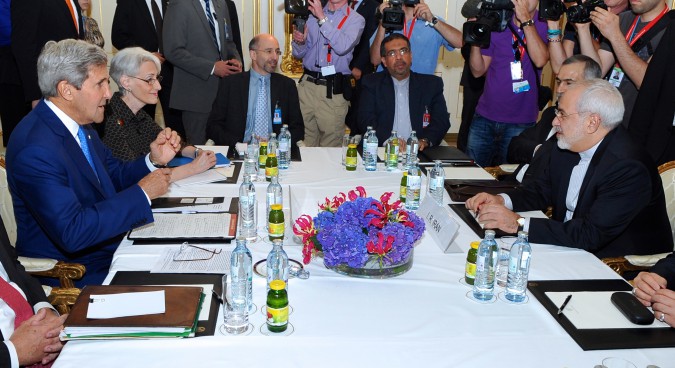

N.Korea dissatisfied with Iran’s improved Western ties
U.S. deals with Iran, Cuba, Myanmar leave North Korea in isolated, exposed position: expert
From Implementation Day on January 16, when the International Atomic Energy Agency said that Iran has curbed its nuclear program enough to begin receiving sanctions relief, through Tuesday the state-run Korean Central News Agency (KCNA) has published more than 10 stories related to Iran. These stories have included those political in nature, such as coverage of the U.S. Navy vessel that was briefly detained after drifting into Iranian waters.
But the KCNA had remained silent as to any news related to the West’s lifting of sanctions on Iran after its successful fulfillment of steps to shrink its nuclear program. The Monday Rodong editorial may be regarded as North Korea’s first public recognition of the Iran’s recent changes.
“The Western world is bustling over the recent Iran–U.S. change in relations, calling it as the ‘model for settling an international dispute.’ But this is their misappraisal of the subject,” the editorial reads.
The 500-word editorial indicates that Pyongyang is concerned about Iran’s denuclearization policy bringing it closer to the West.
“Recently the U.S. has brought up new sanctions against the 11 Iranian entities and individuals just because they were involved in Iran’s ballistic missile program,” wrote the Rodong editorial, referring to the U.S. Department of the Treasury’s announcement on January 17.
“Raising new sanctions on Iran right after lifting the previous ones vividly shows what the U.S. is aiming at. They are trying to diminish and restrain Iran’s national power to turn the state into one more obedient to the U.S.”
Balazs Szalontai of Korea University in Seoul told NK News that North Korea is strongly dissatisfied with the post-2013 Iran-U.S. rapprochement, especially because the Obama administration also improved relations with Myanmar and Cuba.
“This has left North Korea in an isolated and exposed position, and enabled the U.S. government to claim that the main obstacle to U.S.-North Korean rapprochement is North Korea’s inflexibility,” Szalontai said.
Szalontai said that Iran and North Korea might have argued over North Korea’s recent nuclear test, which can explain why North Korea has found it necessary to publicly express its disapproval of Iran’s foreign policy.
“The U.S. will keep pushing to sanction Iranians further,” the Rodong reads.
“The U.S. even threatened the Iranian government that it would bar the country again from the rest of the world if the Iranians violate their recently signed agreement. This shows that the U.S., if they wish, can shred the recent Iranian-U.S. agreement like a scrap of paper.”
“Bloody lessons learnt from the recent Iraq and Libya incidents show that obeying the U.S.’s manipulations will only be paid back with destruction, chaos and death.”
On Monday Iranian President Hassan Rouhani and Italian President Sergio Mattarella signed an $18.4 billion contract covering cooperation in sectors from oil services to agriculture.
Featured image: Wikipedia
